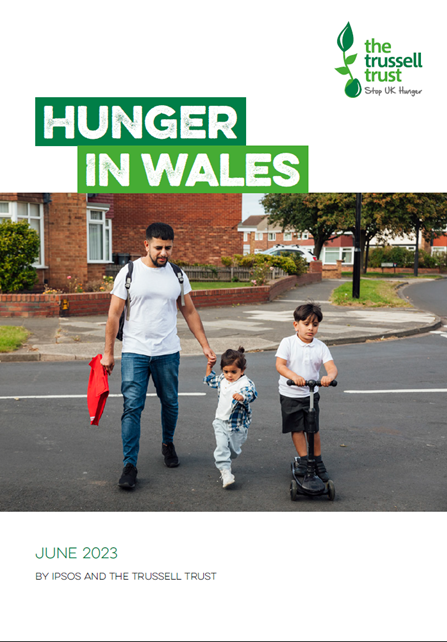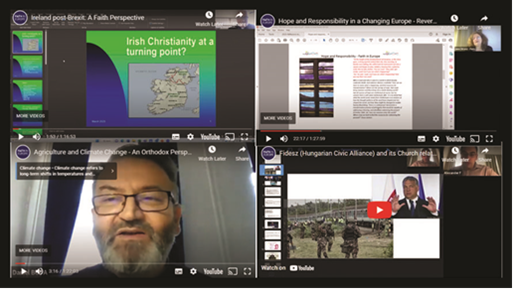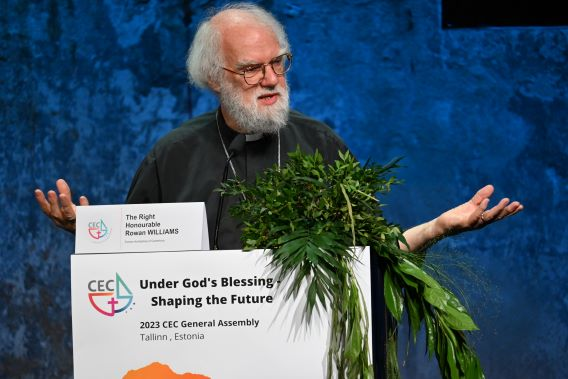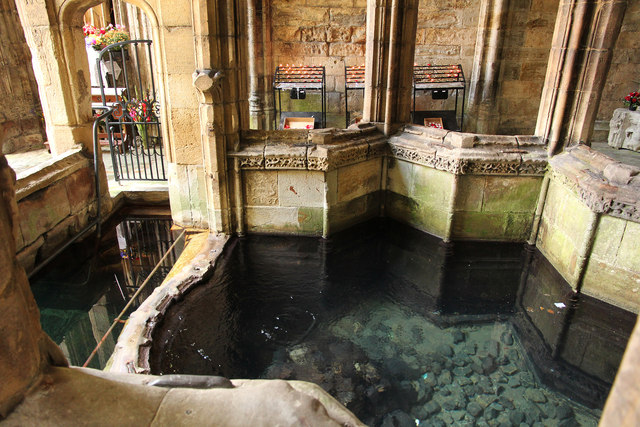THE REALITY OF HUNGER IN WALES

One in five people face hunger across Wales, with disabled people, carers, families with young children and single parents among groups disproportionately at risk, is the startling finding of new research published by the Trussell Trust.
The main driver is a lack of money, revealing that the social security system is failing to protect people. This leads to further issues such as worrying levels of social isolation and loneliness, spiralling debt, and a decline in physical and mental health.
The charity, which is supported by many churches across Wales, is calling on the UK Government to create an ‘Essentials Guarantee’ to ensure Universal Credit payments never fall below the amount needed to cover life’s essentials.
The Trussell Trusts’ food banks in Wales provided more than 185,000 emergency food parcels in the last year, a record number which is an 85% increase compared to the amount provided five years ago. The report says this consistent upward trajectory exposes that it is weaknesses in the social security system that are driving food bank need, rather than just the pandemic or cost of living crisis.
The research also finds this is just the tip of the iceberg. Around 6% of the population in Wales was supported by charitable food support, including food banks, yet most people facing hunger (74%) had not accessed any form of charitable food support.
The charity says many people would like to work but some face difficulty accessing jobs, including disabled people and carers, and parents who can’t find affordable childcare. The majority (92%) of people referred to food banks in the Trussell Trust network in Wales receive a means-tested benefit such as Universal Credit, but this did not provide enough to cover the cost of essentials.
The study finds paid work does not always protect people from having to use food banks. One in five people forced to turn to food banks in the Trussell Trust network in the UK are in a working household. Just under a third (30%) of people in work who have had to use a food bank, are in insecure work such as zero hours contracts or agency work.
Trussell Trust and the Joseph Rowntree Foundation are calling on the UK government to create an ‘Essentials Guarantee’, to enshrine in law the amount Universal Credit payments should be to guarantee that our essential items, such as food and bills, are always covered. Once this is set, reductions like debt repayments to the Government or because a claimant has reached the Benefit Cap, should not pull support below this level.
Susan Lloyd-Selby, Network Lead in Wales at the Trussell Trust, says: “Being forced to turn to a food bank to feed your family is a horrifying reality for too many people in Wales, but as Hunger in Wales shows, this is just the tip of the iceberg. Hundreds more people are struggling with hunger. This is not right. Food banks are not the answer when people are going without the essentials in one of the richest economies in the world. We need a social security system which provides protection and the dignity for people to cover their own essentials, such as food and bills.”
Susan adds, “Across Wales, churches play a vital role in the work of food banks, supporting them through providing leadership, prayer, volunteers, food and finance. Local churches are rooted in their communities and are connected to the structures and institutions that can help create social change. Church communities include thousands of people whose collective voice can be a powerful advocate for justice. We believe churches have a unique role to play in this and hope they will use their voice to support our calls for change to end the need for food banks.”
Therefore Trussell Trust are currently seeking to recruit church ambassadors who could give 3-4 hours a month to support church engagement.
Shortly after the report was published, Welsh Government announced that it will not be funding free meals during this year’s summer holidays for those children who in term time are entitled to free school meals. This will add further pressure to families over this summer. A topical question in the Senedd on July 12 showed cross-party disquiet about this decision, and it was stated that foodbanks are worried about the potential impact of it.
Welsh Government announces its legislative programme
On June 27, First Minister Mark Drakeford announced the Welsh Government’s legislative programme for 2023-24, with further details following in announcements by individual ministers. We can expect the following legislation to come before the Senedd in the next 12 months:
- Welsh Language Education Bill, to encourage Welsh medium education and the use of Welsh in English medium education in Wales.
- Bus (Wales) Bill, to introduce a franchising system for public bus routes
- Disused Tips Safety (Wales) Bill to establish a new supervisory authority and regulatory regime for disused coal and other spoil tips in Wales.
- Social care reform legislation, to remove private profit from the care of looked-after children; introduce direct payments for continuing health care (as already exist for social care); and change aspects of the regulation of social care.
- Electoral administration and reform legislation to simplify applications for voter registration and postal ballots and consolidate existing legislation for Senedd and local elections.
- Senedd Reform Bill to increase the size of the Senedd to 96 members using a closed list system and establish new constituency boundaries for the 2026 election.
- Gender Quotas Bill to introduce gender quotas for candidates for elections to the Senedd.
Future years of this Senedd (until 2026) will see the following legislation brought forward:
- Environmental Regulation and Biodiversity Targets (Wales) Bill to replace former EU environmental regulation and introduce legal targets for biodiversity and nature restoration.
- A bill to introduce local tourism levies and statutory licensing for holiday lets.
- Legislation reforming homelessness services.
- Building Safety (Wales) Bill to improve regulation and residents’ voice for all multi-occupation residential buildings and improve fire precautions, and secondary legislation to tighten regulation of the building control profession.
- Taxis and Private Hire Vehicles (Wales) Bill to set national minimum standards for drivers and vehicles and enable better regulation across local authority boundaries.
- Tribunals (Wales) Bill to streamline the administration of the devolved Welsh tribunals.
- Consolidation of planning laws in Wales.
- Secondary legislation to restrict price and multibuy promotions by large retailers of foods high in fat, sugar and salt. (This was misleadingly portrayed in the media as a “ban on meal deals” but the restrictions will apply only to products high in fat, sugar and salt).
The ‘Laser Group’ of church and society officers from the churches and Christian organisations of Wales meets six times a year to monitor Senedd legislation and consultations, to share work and perspectives with one another, and to arrange for joint responses to be submitted to the Senedd and Welsh Government where need arises. The Group is always glad to hear of topics which it should be looking at, and can be contacted via gethin@cytun.cymru.
Introducing Faith in Europe

Faith in Europe, recently welcomed as a ‘Category B’ member of Cytûn, is an educational charity. Its aim is to brief its member representatives of British Churches and the wider public on political, social, and cultural issues across Europe, from faith perspectives.
Faith in Europe evolved out of several previous organisations in the geopolitical and faith context of the post-Second World War period, with origins dating back to 1961. The contribution of Faith in Europe to discussion, analysis and scholarship on the interplay of religion and the political and economic environment has been unique and of lasting value. Faith in Europe continues to offer a public programme for learning and debate that reflects the concerns of today and anticipates the concerns of tomorrow.
Faith in Europe convenes an ecumenical management committee including representatives of British churches, who collaborate in programming online keynote seminars called Briefings, which take place four times a year. One or two invited speakers introduce a specific topic of current concern, followed by questions, breakout discussions and contributions from members. Briefings are well prepared presentations that explore topics at considerable depth. These are participatory events with a small and highly engaged audience. Recent Briefings have included Fidesz (Hungarian Civic Alliance) and its Church relations from Rev. Alex Faludy, Agriculture and Climate Change – An Orthodox Perspective from Archpriest Dr Daniel BUDA, Hope and Responsibility in a Changing Europe from Reverend Jane Stranz and Anthea Sully, Reflections on a post-Brexit Ireland from The Catholic Bishop of Derry Donal McKeown and the, District Superintendent for the Methodist Church in Ireland, North Western District, Rev Dr Stephen Skuce.
Faith in Europe has seen significant change in recent years with its shift to online events. This has enabled greater participation from its members across the UK and has also enabled greater participation of speakers from across Europe. In 2022 Faith in Europe introduced Panel Sessions, which are shorter meetings that convene practitioners and academics for very short contributions and plenary discussions on topics of immediate concern in rapidly changing contexts. This resulted in a panel session exploring the response of churches to the war in Ukraine.
Further changes have included appointments of new members and officers in 2022 and new branding in 2023. Faith in Europe is supported in-kind through partnerships with Churches Together in Britain and Ireland and the Centre of Religion, Reconciliation and Peace (University of Winchester).
This is an interesting period for Faith in Europe, if you take interest in religion and its interplay with political, social and cultural concerns in Europe, Faith in Europe welcome all to attend its Briefings. Faith in Europe produces occasional publications and reports, which can be found on its website. Its briefings are also published on its website https://faithineurope.org.uk/.
Contact the General Secretary Rebecca Bellamy at generalsecretary@faithineurope.org.uk.
Cytûn’s Wales and Europe Working Party
As well as working with Faith in Europe (see previous page), Cytûn has its own Wales and Europe Working Party. Set up at the request of our member churches following the 2016 referendum, the Working Party initially kept abreast of the Brexit process on behalf of our members. That process is in some ways still not completed – hence the UK Government’s EU Retained Law (Revocation and Reform) Act. This repeals almost 600 pieces of European legislation, and puts in place the mechanism to revoke or reform the remainder, both at Westminster and in the Senedd.
At the meeting of the Working Party in July, concern was expressed that more than half of the pieces of legislation to be repealed immediately are environmental regulations. The UK Government has published a list of these regulations with a brief summary of their purpose. Many are obsolete, or relate to England only, but some do seem to remove important protections, such as limiting the fishing of bluefin tuna and some other types of fish. Welsh Government has yet to announce its intentions with regard to reform and revocation of EU law, and the Working Party will continue to monitor the situation.

Now that the UK has left the European Union, the Working Party is concentrating on building relationships between the churches of Wales and churches across Europe (not only in EU countries). The Conference of European Churches, of which Cytûn and a number of our member churches are part, met in Tallinn in Estonia in June, and the July Working Party meeting heard comprehensive reports on the Assembly. The Assembly’s statements on Ukraine, climate change and migration can be read here and Cytûn’s video reports from the Assembly can be viewed here.
Cytûn is also, along with a number of our member churches, a member of the Churches’ Commission for Migrants in Europe (CCME). With the Bible enjoining us to “welcome the stranger” and Wales’s ambition to become a nation of sanctuary, Cytûn is looking to work with CCME and others to take forward our contribution to this important policy area.
Pilgrim Ways

Whether it’s to rediscover long-hidden history, for faith, fitness or just for fun, a new collection of Catholic walking pilgrimage routes in England and Wales can now be found online.
www.pilgrimways.org.uk provides walking guides, GPX files, prayers and other resources for those keen to undertake a pilgrimage. There are downloadable ‘Pilgrim Passports’ and at the end of a walk, pilgrims can receive an official certificate, like the ‘testimonium’ available at the end of the Camino di Santiago de Compostela and the Via Francigena, as seen in the BBC TV series, Pilgrimage.
Pilgrim Ways has launched a new initiative called ‘Hearts in Search of God’. The inspiration behind this name comes from Pope Francis’ words about pilgrims: ‘Whoever they may be — young or old, rich or poor, sick and troubled or curious tourists — let them find due welcome, because in every person there is a heart in search of God, at times without being fully aware of it.’
This is a three-year project to encourage people of all faiths and none to experience a pilgrimage walk in their own locality. The Ways start at each of the 22 Catholic Cathedrals in England and Wales and strike out through town and countryside to one or more the local Shrines. The routes in Wales are the St David Lewis Way in Cardiff Archdiocese, the Way to St Anthony’s Well in the Diocese of Menevia, and the Holywell Way in the diocese of Wrexham.
These new routes are greener too. Reaching some of Christendom’s holiest sites can mean beginning or ending the journey with an inter-continental flight – but local pilgrims leave much smaller carbon footprints.
The man behind this project is retired GP Dr Phil McCarthy. Phil walked from Canterbury to Rome in 2008 and from Rome to Istanbul in 2015. Despite sciatica, he has so far walked seven of the Ways and plans to complete the rest over the next two years. Phil says: ‘you don’t have to be formally religious or be walking as part of a big group to follow these Ways. Walking allows us all to pay attention, to notice small things and to enjoy ordinary places. I hope the new Pilgrim Ways will be an opportunity for Christians to deepen their faith, but also for people of all faiths and none to experience a pilgrimage in a Catholic context and with the minimum of financial and environmental cost.’
Pilgrimage is an important aspect of Catholic spirituality. Wales has a unique history of Catholic pilgrimage and a number of sacred shrines with great importance to the Welsh Catholic community’s heritage. Please do take a look at this website, especially at the interactive map and the history of Catholic pilgrimage in England and Wales. For more information please contact Molly Conrad: molly.conrad@cbcew.org.uk.
UK COVID 19 INQUIRY
The inquiry, chaired by Baroness Hallett, has held Module 1 public hearings into the UK’s preparedness for a pandemic up to January 2020. This included evidence from Welsh and UK Governments, from experts in the field, and from Covid-19 Bereaved Families for Justice Cymru. The videos and transcripts of each session can be found here.
Brief reference has already been made to faith groups in Wales. Cytûn and the Inter-faith Council for Wales are co-ordinating a submission from churches and other faith groups on government actions from February 2020 onwards for Module 2B. Any denomination or network, local church or other faith group wishing to contribute to this submission should send input to gethin@cytun.cymru by September 15th at the latest, so it can be prepared for the Inquiry in good time.
POLICY BRIEFS
Homeless Sunday 2023
will be held on Sunday October 8, and as always Cytûn member Housing Justice Cymru will be sharing a range of resources on issues surrounding homelessness for churches to use. These will include relevant prayers, readings and Junior Church resources, as well as information and educational materials. Please email j.whitney@housingjustice.org.uk for more details.
Fairtrade Fortnight 2024 – change of dates
Next year marks 30 years of the FAIRTRADE Mark in the UK. Throughout 2024, there will be lots of ways to celebrate this major milestone. And to shake things up a little, Fairtrade Fortnight is moving! In 2024, Fairtrade Fortnight will take place 9 – 22 September.
The move will give us all more time to prepare and celebrate 30 years of farmers powering positive change in communities all around the world.
Read more about plans for Fairtrade Fortnight in 2024 here.
Silent vigils at the Senedd for sustainability and climate action
South Wales Quakers have been holding Silent Vigils for sustainability and climate action outside the Senedd, at 2pm on the third Wednesday of each month since January 2022, with the permission of the Senedd authorities.
The silence of prayer and the stillness of meditation send a strong message to those in power. To complement the silence, we hand out to passers-by information focused entirely on climate: we stress the recent final warning from the Inter-governmental Panel on Climate Change: This is the last moment, the last chance for governments to take action.
Anyone is welcome to join us who is prepared to take part in a silent vigil. We will be seated beneath the overhanging roof that covers the Senedd terraces. Do bring either a cushion or a folding chair, as the slate terraces are both hard and cold.
For more information, contact Robin Attfield: AttfieldR@cardiff.ac.uk
CONTACTING CYTÛN’S POLICY OFFICER
Parch./Revd Gethin Rhys – Swyddog Polisi/Policy Officer
Cytûn – Eglwysi ynghyd yng Nghymru/Churches together in Wales
Registered office: Room 3.3, Hastings House, Fitzalan Court, Cardiff CF24 0BL
Mobile: 07889 858062
E-mail: gethin@cytun.cymru www.cytun.co.uk @CytunNew
Hapus i gyfathrebu yn Gymraeg ac yn Saesneg.
Happy to communicate in Welsh and English
Cytûn is a registered company in England and Wales | Number: 05853982 | Registered name: “Cytûn: Eglwysi Ynghyd yng Nghymru/Churches Together in Wales Limited” | Cytûn is a registered charity | Number: 1117071
Publication date: July 20 2023. The next Bulletin will be published on September 28 2023.
